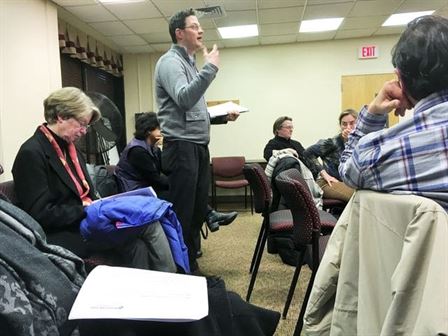The Montclair State University Senate voted on and moved a privacy policy proposal addressed by the Latino/a Caucus in January, involving Deferred Action for Childhood Arrivals (DACA) and undocumented students’ safety in wake of an upcoming congressional deadline for DACA and immigration decision happening in March.
Representative of the caucus and associate sociology professor Stephen Ruszczyk revealed that advisors could view if someone is undocumented through NEST information systems, which shocked many on the Senate board as they deemed the access unnecessary.
The status of a students’ citizenship was widely accessible to advisers through Banner, but Office of Information Technology (OIT) worked to make it less accessible immediately. They are still working to make sure the information is available only when necessary, like for financial aid purposes.
Senate President David Trubatch took charge of writing the now accepted proposal to university President Susan Cole.
Trubatch said to go to OIT if they happen to have access to the information so they can fix the issue.
“Montclair State University and the University Police do not and will not inquire about the immigration status of our students,” said Cole last year in a written statement to the community. “The University will not provide information about our students’ immigration status to federal officials in the absence of a subpoena or comparable legal order and the University maintains a strong commitment to and compliance with federal and state privacy laws applicable to our students.”
Students voiced their thoughts on advisers being allowed to view citizenship status of students.
“If they are using the advisers in a strategic way to help the students, then I think it’s wonderful,” said senior sustainability science major Carlygrace Sunday. “But if they are going to take that information and they are going to distort it, and they are going to use it against the students then absolutely not. I think that everyone deserves the right to education, and I think that if they are working on their path to citizenship then they should be allowed to have the same rights as us.”
Freshman justice studies major Luz Corado compared citizenship status to gender.
“Basically it’s like if we were talking about male or female; if you don’t feel comfortable sharing that information it shouldn’t be shared or it shouldn’t be looked up,” Corado said. “If the student is already here, why does their immigration status need to be known?”
Other subjects the Latino/a Caucus brought to attention in wake of the unknown status for DACA and undocumented immigrants in March was stated in their blueprint. The document’s means is to make sure the university welcomes, protects and supports undocumented students.
The blueprint addresses several ideas including making it clear that Montclair State welcomes students and has specific information on the university’s website regarding DACA and undocumented students and their statuses. This has already been initiated, and the last update on the immigration page was Feb. 15.
The caucus also wishes to have a safe space program for the protection of DACA students and families, like the university has for the LGBTQ community.



